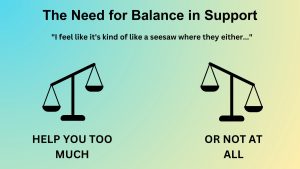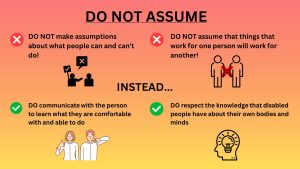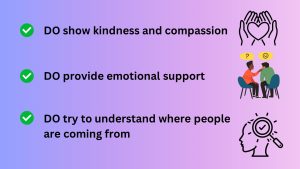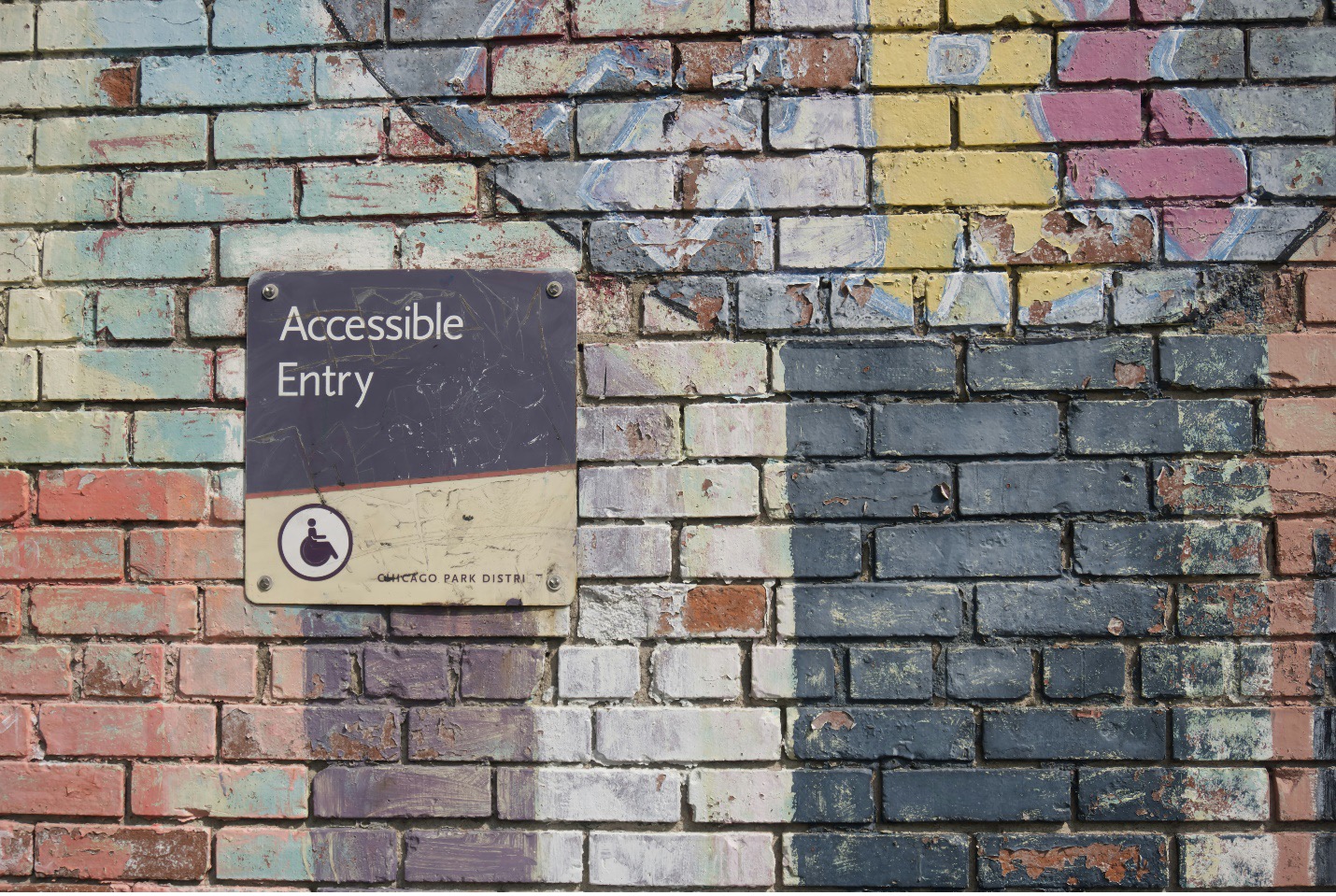21 Accessibility and Disability Inclusion in Research, Instruction, and Course-Level Enhancements
Accessibility in Teaching and Learning STEER/R Project Team Development
In preparation for the launch of the Accessibility in Teaching and Learning (ATL) Roadmap Project, an Accessibility / AODA Consultant and Research Associate and Accessibility Project Support Coordinator were hired by Project Manager, Christine Yachouh, and Vice-Provost, Teaching and Learning, Dr. Kim Dej.
Student Accessibility and Alumni Council roles, including a Council Coordinator, were established in partnership with the SSC’s Career Access Professional Services (CAPS) Program, incorporating lived experiences of diverse disability into the development of an advisory function for the ATL Project. Additional project team members include community members from various units and faculties across the institution.
Through expert support from the OVPTL Project Manager and Grants Coordinator, the creation of the ATL Project and the hiring of a project team has established a fundamental springboard to launch applications of over $20M in grants related to accessibility and disability work and scholarship.
Contributors: The Accessibility in Teaching and Learning Project Team, Office of the Vice-Provost, Teaching and Learning
Accessible Teaching Resources and Supports from the MacPherson Institute
The MacPherson Institute continues to support accessibility / disability-inclusion work by developing and enhancing resources, workshops and supports, including:
- A 5-part workshop series on Universal Design for Learning (UDL) that is offered 2-3 times per year.
- Workshops focused on accessible document creation and remediation
- An accessibility focused version of the Assessment Development Workshop (ADW).
- Department-specific presentations on UDL delivered upon request; 5 presentations were given in 2022-2023.
- Bringing together the Accessibility Community of Practice which continues to convene and share reflections and topical presentations related to accessibility ensuring ongoing collaboration and learning within the community.
- In partnership with the Equity and Inclusion Office, launching the McMaster Inclusive Teaching and Learning Resources webpage.
In addition, two MacPherson Institute Educational Developers were the successful recipients of the inaugural Accessible Learning Fellowship. Their Fellowship proposal aims to gather narratives from instructors who have implemented Universal Design of Learning (UDL) in their course design.
Contributors: MacPherson Institute
Accessibility Resources for Graduate Students
In partnership with the School of Graduate Studies, the MacPherson Institute hired two graduate students to design and develop resources for disabled graduate students. Additionally, they also assisted with submission of successful grant application and received funding from eCampusOntario for the subsequent facilitation of a project aimed at working with an accessibility specialist on making the “Graduate Studies Thesis Toolkit” resource digitally accessible.
Contributors: School of Graduate Studies, MacPherson Institute, eCampusOntario
Creating Accessible 1P13 Engineering Content
Our Engineering faculty has created a framework for converting digital course material into an accessible format. With the Integrated Cornerstone Design Projects in Engineering (1P13) course, we conducted an audit of over 300 student-facing documents and 60 videos. Our primary focus was on redesigning lecture PowerPoint files, which were considered the most important student-facing documents. We redesigned all lecture files in the five key areas of digital accessibility: sufficient colour contrast, accessible template, alt text, accessible diagrams, and video-closed captioning.
By the end of August, 2023, we had redesigned most of the lecture PowerPoint files and 60 videos to make them accessible in the five key areas. Furthermore, we replaced nearly 80% of inaccessible PDFs with their original format on Avenue to Learn.
Our faculty remains committed to promoting inclusivity and accessibility.
Contributors: Dr. Colin McDonald, Jing Sui, Nawaal Fatima, Gagandeep Sekhon, Basem Yassa, Dr. Elizabeth Hassan, Dr. Shelir Ebrahimi, Dr. Bryan Lee, Dr. Thomas Doyle, Dr. Robert Fleisig, Engineering Associate Dean’s Office
Designing an Accessibility in Teaching and Learning Roadmap for McMaster University
In response to the Accessibility for Ontarians with Disabilities Act (AODA) Postsecondary Education Standard Recommendations Report, the Office of the Vice-Provost, Teaching and Learning has sponsored and launched the Accessibility in Teaching and Learning (ATL) Roadmap Project as part of the Strategic Excellence and Equity in Recruitment and Retention (STEER/R) Program. The project is the first of its kind within the Ontario University sector and aims to create a five-year Teaching and Learning Accessibility Roadmap, underpinned by early adoption of the report’s 185 recommendations to enhance educational experiences for students with disabilities at McMaster.
The first phase of the STEER/R project has been marked by in-depth analysis of the report’s 185 recommendations, conducting key informant interviews across McMaster Faculties and Central Units, and the development of journey and experiential roadmaps to better understand the experiences of accessibility and accommodations for students with disabilities and faculty members at McMaster. The project also includes the development and launch of a groundbreaking Accessibility Fellows Program, fostering space for engagement with critical disability and accessibility-focused research, and forming an inaugural Student and Alumni Accessibility Council, will bring invaluable ‘lived experience’ perspectives into the ongoing development and refinement of the ATL STEER/R project, ensuring that the initiatives are grounded in real-world disability needs and experiences.
Contributors: The Accessibility in Teaching and Learning Roadmap Project Team, Office of the Vice-Provost, Teaching and Learning in partnership with the Equity and Inclusion Office, the McMaster Accessibility Advisory Council, Student Accessibility Services, the Libraries, the MacPherson Institute, the Student Success Centre, the Faculty of Health Sciences, the Faculty of Science, and the Faculty of Social Science, and more
Distory, Then and Now
Distory, Then and Now is an ongoing inclusive community project led by Dr. Ann Fudge Schormans that brings together institutional survivors and younger people labeled/with intellectual disabilities, artists, community members, and academic researchers to develop educational materials for post-secondary students to learn about institutionalization and ongoing struggles and resistance of people labeled/with intellectual disabilities. This work includes writing for publication. Over the course of 2022-2023, a second co-authored piece was published. Six (of thirteen) DiStory co-researchers, Erin Kuri (SW, Ph.D. graduate), and Ann Fudge Schormans wrote a found poetry piece, “Justice versus Injustice” which was published by Brill/Sense Publishing, in the book Re-defining Disability, edited by Bones, P.D.C,, Smart Gullion, J., & Barber, D.
As part of the “Peer Support for Women with Intellectual Disabilities with Experience of Sexual Assault” project, Ann joined other academic and community partners and co-researchers labelled/with intellectual disabilities in the preparation of an academic paper which is currently under review. Women labelled/with intellectual disabilities who have experience of sexual assault are co-investigators on this inclusive research project led by Maria Huijbregts of Family Services Toronto. A second paper is in process.
Contributor: Ann Fudge Schormans
Ecosystems of Support: the power of intentional service design and relationship development in navigating and dismantling institutional barriers
McMaster’s Strategic Framework is committed to advancing accessibility on an institutional level. Increased awareness of existing barriers prompts staff and management to analyze: what we can do to support change?
On May 2, 2023, drawing on disability justice, inclusive design theories, and knowledge gleaned from lived experience, this panel demystify how staff leveraged their service-expertise, campus positionality, and collegial relationships to establish ecosystems of support to improve student experience on the journey from prospective student to alumni.
Contributors: Julia Millington, Celeste Licorish, Kathrine Hesson-Bolton, Tanya Kett, Kate Brown
Exploring the Impact of Flexible Course Assessment on Undergraduate Student Outcomes
The amount of students registered with Student Accessibility Services (SAS) is rising (Adeel et al., 2023). Traditional assessment methods often prioritize high-stakes assessments, potentially neglecting the diverse learning needs of undergraduate students, specifically those registered with SAS. Studies suggest flexible assessment schemes, defined as an adaptable assessment approach where students have autonomy in their learning, have been effective in improving student outcomes, but there is conflicting evidence as to whether multiple low-stakes assessments or fewer high-stakes assessments are more effective assessment approaches. We introduced a flexible assessment scheme consisting of fewer high-stakes assessments supplemented with optional low-stakes assessments, and used surveys and focus groups to collect data on student perspectives. Our results are promising, and indicate that our flexible assessment model improves student outcomes overall, garnering interest amongst undergraduate students for more autonomy in their undergraduate education and informing future course design at McMaster University and beyond.
Contributors: Miriam Goldstein, Katie Moisse
Faculty of Social Sciences Teaching and Learning Updates
The Faculty continues to leverage the ‘EdTech Rover’ team (current and former Graduate students) who are deployed to assist with a variety of teaching technology situations that arise in virtual and physical classrooms. They often provide a variety of teaching accommodation/accessibility support activities in the classroom and are deployed to assist students and instructors directly in the classroom – in-person or online. This team facilitates many complex accommodation situations for students and instructors in the classroom, including but not limited to caption corrections on media, real-time exam support for students in Avenue, classroom accommodations setups for hybrid situations, and real-time classroom support.
Contributors: Nick Marquis, Learning Technologies Consultant, Faculty of Social Sciences on behalf of the Faculty and several leads distributed across all departments
Increased Inclusion of Students with Disabilities in Health Professional Programs
The School of Rehabilitation Science is funded through the Strategic Excellence and Equity in Recruitment and Retention (STEER/R) fund to develop recommendations, guidelines and tools that increase the inclusion of students with disabilities in health professional programs. Our first project is a scoping review of the literature to identify strategies that increase the accessibility of health professional programs. We searched six databases and the grey literature and screened almost 10,000 abstracts. From the final 243 sources included in the review, data extraction helped us determine that almost half the sources are commentaries, discussions, and recommendations that address accessibility in health professional programs. Disability-related accommodation is the strategy most often cited in these sources. 13 studies in total tested accessibility strategy(ies), demonstrating that while there is much discussion in the literature about accessibility, there is limited research evaluating strategies. Analysis is ongoing and final results will be shared in the future.
Contributors: Dr. Shaminder Dhillon, Ms. Michelle Ira Roque, Dr. Dina Brooks, Ms. Paige Maylott and Dr. Sarah Wojkowski, School of Rehabilitation Science
Leveraging AI for Research Extraction in the School of Rehabilitation Science
Paige Maylott, serving as the Accessibility Project Support Coordinator and hired out of the Office of the Vice-Provost, Teaching and Learning, led an innovative project focused on Artificial Intelligence (AI)-supported research extraction under the leadership of Dr. Shami Dhillon in the School of Rehabilitation Science (SRS) and in consultation with Accessibility / AODA Consultant, Kate Brown.
This project, part of the SRS STEER/R initiative, aims to review and extract data from over 250 research papers, and focuses on analyzing trends in strategies to increase the accessibility of health professional programs. This methodology is supported by accessibility remediation techniques learned through Library Accessibility Services, and third-party text-splitting tools, addressing challenges of data security, error minimization, and ensuring rigorous analysis of the accuracy of outputs through a blend of human insight and machine efficiency using human-in-the-loop methodology.
Contributors: Paige Maylott, Accessibility Projects Support Coordinator and the SRS STEER/R Project
McMaster Institute for Research on Aging (MIRA) and Dixon Hall Partnership to Support Older Adults
In 2021, the Mc Master Institute for Research on Aging (MIRA) created the MIRA | Dixon Hall Centre, a unique partnership between MIRA and Dixon Hall, an established multi-service agency located in the heart of downtown Toronto. Through working with Dixon Hall, MIRA and its researchers seek to enhance research with, and services for, older adults who are facing housing insecurity, barriers to mobility, transitions in care (such as from the hospital to community) and equitable access to digital technology for older adults. These individuals historically have experienced barriers to accessing services and being represented in research. The centre is funded through a generous donation from Suzanne Labarge whose contributions to Dixon Hall are also assisting with technology, enabling critical enhancements to client data storage and supporting client connectivity – something that has never been more vital.
Contributors: Parminder Raina and Marla Beauchamp, MIRA | Dixon Hall Centre Partnership
McMaster Institute for Research on Aging (MIRA) and Labarge Centre for Mobility in Aging (LCMA) Support Aging and Mobility Research
The McMaster Institute for Research on Aging (MIRA) is a cross-Faculty research institute focused on advancing the science of aging. It includes the Labarge Centre for Mobility in Aging (LCMA) which facilitates and amplifies research that helps support older adults to maintain their mobility as they age. While the growing population of older adults in Canada is great news, there are also challenges in developing policies and solutions that consider the aging population. MIRA encourages researchers to engage with older adults, their families, healthcare providers and other stakeholders through every stage of our activities to create and share back with the public usable, older adult-centred solutions that promote aging in place. Both MIRA and the LCMA provides research and trainee funding to support a range of research projects that support improved accessibility including:
- The development of assistive hearing technology to enhance the accessibility of musical performances;
- Designing and trialing a simple-to-use application for assessing frailty risks in home; and
- Exploring how to effectively and safely offer rehabilitation programs remotely
Contributors: Parminder Raina, and Allison Dube, McMaster Institute for Research on Aging (MIRA) and the Labarge Centre for Mobility in Aging (LCMA)
Neurodivergent Student Survey to Improve Course Accessibility
To gather information on how to improve course accessibility, neurodivergent students at McMaster shared their experiences with online learning and the return to in-person courses with our research team. An open-ended survey was distributed in an initial exploratory phase, and students expressed that online learning was associated with 1) increased autonomy (i.e., through self-guided, asynchronous content), 2) motivation challenges (i.e., due to the absence of classroom environment), 3) decreased structure (i.e., due to changing routines) and 4) decreased support (i.e., inadequate accommodations).
A second phase aimed to further explore these themes through interviews. The two main opportunities identified were 1) increasing flexibility in education (i.e., providing lecture recordings) and 2) removing roadblocks by increasing awareness and availability of supports. We are grateful for the enthusiastic participation in this research and hope to use the knowledge gained to improve the experience of current and future neurodivergent students at McMaster and beyond.
Contributors:, Dr. Frances Tuer, Sierra Vaillancourt, and Chantelle Castelino, DeGroote School of Business and MacPherson Institute
Student Perspectives on HyFlex Learning Spaces
The number of students registered with Student Accessibility Services (SAS) is rising and traditional university classrooms do not always create the most inclusive and accessible learning environments possible (Adeel et al., 2023). We conducted surveys and focus groups to gather student perspectives on HyFlex learning spaces to address this issue. A HyFlex learning environment is defined as a classroom space which allows students the autonomy to choose whether they interact with the course in-person or virtually, synchronously. Of the data collected, 83.8% of students agreed that the autonomy of HyFlex has benefited their learning (n=68), with 100% agreement amongst SAS registered students (n=10). Results indicate that HyFlex learning environments aid in creating more accessible learning spaces, result in better learning outcomes for students, especially those with accessibility needs, and may help define the future of post-secondary learning.
Contributors: Luca Bernardini, Miriam Goldstein, Zoya Adeel, Kate Brown, Lee de Bie Das, Katie Moisse
The Inclusive Teaching and Learning Resource Web Page Launched
The Inclusive Teaching and Learning Resource web page resource page was developed in partnership with the MacPherson Institute and the Equity and Inclusion Office, in line with McMaster’s EDI Strategy: Towards Inclusive Excellence and McMaster’s Partnered in Teaching and Learning Strategy. This resource page was launched in August 2023 to provide resources, links and tools that instructors may find helpful in creating inclusive teaching and learning spaces. Grounded in Equity, Diversity, Inclusion, Accessibility, and Decolonization best practices (EDIAD) integrated with Anti-Racist pedagogical implications and Indigenous Andragogical considerations, all of which contribute to the development of inclusive, diverse, and accessible teaching methods.
We included an accessibility section on the Inclusive Teaching and Learning Resource web page which houses resources in relation to accessibility within teaching and learning.
We are currently reviewing the page and hoping to annually update content. The review process began in December 2023 and new content is anticipated to be added by August 2024 to the Teaching and Learning Resource web page.
Contributors: Aasiya Satia, MacPherson Institute and Renata Hall, Equity and Inclusion Office
Working with adults labelled/with intellectual disabilities to develop disability support staff training materials
As a part of a Master of Social Work Critical Analysis thesis work, Danny completed a participatory action research project which created infographics that communicated what project participants labelled/with intellectual disabilities wanted disability support staff to know. In order to facilitate this, Danny conducted three focus groups and two individual interviews in order to design these infographics. The infographics were created in Canva and depict various “DOs” and “DO NOTs” for support staff. Danny is currently working on disseminating these infographics.
This project received MREB Approval on April 11th, 2023, and the final interview was conducted on September 3rd, 2023. Dissemination of this work is on-going.
Contributors: Danny Pryke, Ann Fudge Schormans






